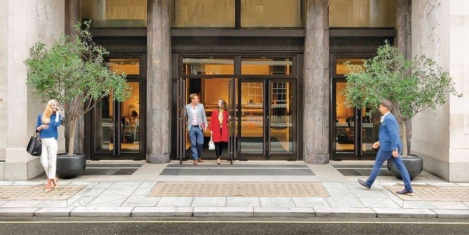To provide the best experiences, we use technologies like cookies to store and/or access device information. Consenting to these technologies will allow us to process data such as browsing behaviour or unique IDs on this site. Not consenting or withdrawing consent, may adversely affect certain features and functions.
The technical storage or access is strictly necessary for the legitimate purpose of enabling the use of a specific service explicitly requested by the subscriber or user, or for the sole purpose of carrying out the transmission of a communication over an electronic communications network.
The technical storage or access is necessary for the legitimate purpose of storing preferences that are not requested by the subscriber or user.
The technical storage or access that is used exclusively for statistical purposes.
The technical storage or access that is used exclusively for anonymous statistical purposes. Without a subpoena, voluntary compliance on the part of your Internet Service Provider, or additional records from a third party, information stored or retrieved for this purpose alone cannot usually be used to identify you.
The technical storage or access is required to create user profiles to send advertising, or to track the user on a website or across several websites for similar marketing purposes.








 The London office market remains a buoyant market despite Brexit uncertainty, as many organisations see it as the most prestigious location for businesses of any size. In
The London office market remains a buoyant market despite Brexit uncertainty, as many organisations see it as the most prestigious location for businesses of any size. In 
 Businesses are concerned about the pace of commitment to improving the UK’s infrastructure, and a record number of firms are dissatisfied with the state of infrastructure in their region. With the UK currently ranking 27th in the world for the quality of its infrastructure, nearly all (96 percent) of businesses in the 2017 CBI/AECOM Infrastructure Survey see infrastructure as important (of which 55 percent view it as critical) to the Government’s agenda. From the Clean Growth Strategy and the £500 billion infrastructure pipeline to its decision to build a new runway at Heathrow and press ahead with the A303 tunnel, the Government has made clear its commitment to British infrastructure. However, only one in five firms is satisfied with the pace of delivery (20 percent) and almost three quarters (74 percent) doubt infrastructure will improve over this Parliament. This lack of confidence is attributed primarily to policy inconsistency (+94 percent of firms) & political risk (+86 percent). The digital sector is the exception, however, where 59 percent of firms are confident of improvements.
Businesses are concerned about the pace of commitment to improving the UK’s infrastructure, and a record number of firms are dissatisfied with the state of infrastructure in their region. With the UK currently ranking 27th in the world for the quality of its infrastructure, nearly all (96 percent) of businesses in the 2017 CBI/AECOM Infrastructure Survey see infrastructure as important (of which 55 percent view it as critical) to the Government’s agenda. From the Clean Growth Strategy and the £500 billion infrastructure pipeline to its decision to build a new runway at Heathrow and press ahead with the A303 tunnel, the Government has made clear its commitment to British infrastructure. However, only one in five firms is satisfied with the pace of delivery (20 percent) and almost three quarters (74 percent) doubt infrastructure will improve over this Parliament. This lack of confidence is attributed primarily to policy inconsistency (+94 percent of firms) & political risk (+86 percent). The digital sector is the exception, however, where 59 percent of firms are confident of improvements.


 Take up of new commercial offices in London’s West End in September 2017 hit the highest quarterly total on record – with tech and media firms, along with serviced office schemes being the most active, according to figures from real estate advisor Savills. The take-up was 857,259 sq ft (79,639 sq m) – bringing total take-up by the third quarter to 1.62 million sq ft (150,498 sq m). Leasing activity in the third quarter of 2017 brings total take-up year to date, to 3.99 million sq ft (370,671 sq m), which already surpasses 2016’s total annual take-up (3.97 million sq ft) and places the West End in a strong position to exceed the record 4.3 million sq ft (399,470 sq m) amassed in 2015. Key deals that helped elevate the market included: Aegis pre-letting the entire 310,000 sq ft (28,799 sq m) at British Land’s 1 Triton Square; The Boston Consulting Group pre-letting 123,500 sq ft (11,473 sq m) at 80 Charlotte Street and Spotify acquiring 104,133 sq ft (9,674 sq m) at The Adelphi.
Take up of new commercial offices in London’s West End in September 2017 hit the highest quarterly total on record – with tech and media firms, along with serviced office schemes being the most active, according to figures from real estate advisor Savills. The take-up was 857,259 sq ft (79,639 sq m) – bringing total take-up by the third quarter to 1.62 million sq ft (150,498 sq m). Leasing activity in the third quarter of 2017 brings total take-up year to date, to 3.99 million sq ft (370,671 sq m), which already surpasses 2016’s total annual take-up (3.97 million sq ft) and places the West End in a strong position to exceed the record 4.3 million sq ft (399,470 sq m) amassed in 2015. Key deals that helped elevate the market included: Aegis pre-letting the entire 310,000 sq ft (28,799 sq m) at British Land’s 1 Triton Square; The Boston Consulting Group pre-letting 123,500 sq ft (11,473 sq m) at 80 Charlotte Street and Spotify acquiring 104,133 sq ft (9,674 sq m) at The Adelphi.











